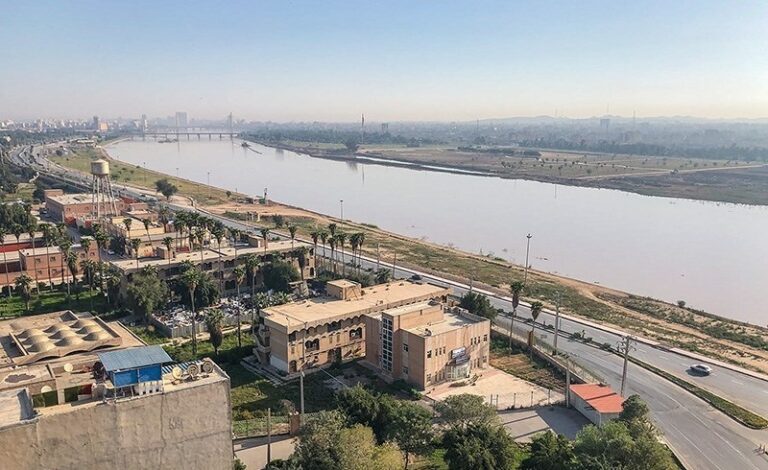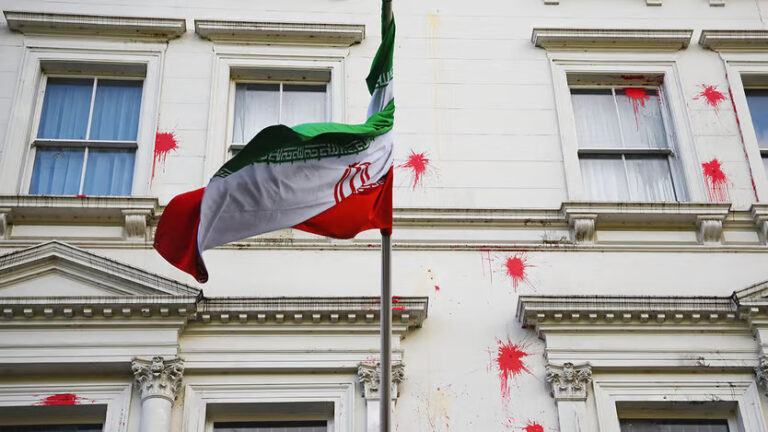At first glance, Iran’s Supreme Leader Ayatollah Ali Khamenei might seem a happy man. The pro-
democracy movement had promised that last Thursday, the 31st anniversary of the Islamic 
Revolution, would be a turning point for the cause of freedom. But Mr. Khamenei’s regime
contained the mounting opposition.
The Islamic Revolutionary Guard Corps (IRGC) controlled Tehran with the help of tens of
thousands of club-wielding street fighters shipped in from all over the country. Opposition
marchers, confined to the northern part of the city, were locked into hit-and-run battles with
the regime’s professional goons. An opposition attempt at storming the Evin Prison, where more
than 3,000 dissidents are being tortured, did not materialize. The would-be liberators failed
to break a ring of steel the IRGC threw around the sprawling compound.
With the Internet shut down and foreign radio broadcasts jammed, the regime imposed its own
version of events. State television showed large crowds chanting “Death to America” while
marching in front of giant portraits of the Supreme Leader.
And yet, despite all of this, Mr. Khamenei’s message thanking the pro-regime marchers after the
“glorious events of the day” had a surprisingly subdued tone. He has reason to feel unhappy.
For the first time the regime had to transform Tehran into a sealed citadel with checkpoints at
all points of entry. The IRGC was in total control. Code-named “Simorgh,” after a bird in
Persian mythology, its operation created an atmosphere of war in the divided city. Warned that
his life may be in danger, Mr. Khamenei was forced to watch the events on TV rather than take
his usual personal tour.
To ensure control of Tehran, the regime had to abandon plans for celebrations in other parts of
the country. Only 20% of Iranian towns and cities and less than 9% of villages had the
privilege of marking the anniversary of the revolution.
The transformation of the Khomeinist regime from theological despotism into military
dictatorship started almost a decade ago. And as a keen student of Islamic tradition, Mr.
Khamenei must know that history is repeating itself.
All Islamic states in history were initially built around an individual claiming divine
legitimacy, first the Prophet himself and then a caliph. All have ended by losing that
legitimacy and maintaining their power by force.
Even the most successful Islamic dynasties—such as the Umayyids, the Abbasids and the
Fatimids—came to depend on mercenaries known as the Mamluks, who were recruited from pagan
tribes of Central Asia. Often the Mamluks seized power by murdering the caliph or keeping him
as a puppet.
The IRGC is a modern version of the Mamluks. Their leaders are more strident than many of the
regime’s leaders, vetoing countless attempts by mullahs and politicians to reach a compromise
with the portion of the opposition still calling for reform rather than regime change.
Revolutionary Guard generals frequently appear on television to call for mass arrests and show
trials. A weak and indecisive caliph, Mr. Khamenei has so far refused to endorse the kind of
“final solution” the generals demand.
Abroad, the Revolutionary Guard pursues an aggressive policy aimed at “filling the vacuum” the
generals hope will be created when the U.S. disengages from Iraq and Afghanistan by funding
terrorist groups and their political front organizations. The IRGC has reportedly created a
special desk to monitor the coming parliamentary elections in Baghdad and Kabul with the aim of
helping pro-Tehran elements win power.
The generals also reject any compromise on the country’s nuclear program. With the entire
program under their control, it is not far-fetched to suggest that even Mr. Khamenei might not
quite know what’s going on.
President Barack Obama’s hopes for a dialogue with Tehran, repeated Sunday by Secretary of
State Hillary Clinton during a visit to Qatar, sound increasingly surreal. Mrs. Clinton’s
announcement that the U.S. might allow one more year for the elusive dialogue to materialize
unfortunately undermined her tougher talk yesterday about sanctions. One thing is certain: The
regime, now dominated by the Revolutionary Guards, will settle for nothing less than total
victory on the nuclear issue.
Mr. Khamenei has other reasons to be unhappy. According to the Ministry of Labor more than a
million jobs have “vanished” in the past 12 months thanks to President Mahmoud Ahmadinejad’
populist policies. In the same period, the nation’s currency, the rial, has lost a quarter of
its value against a basket of other oil-based currencies in the region.
Some foreign companies with long histories of aiding Iran are beginning to understand that the
regime, while not on the verge of collapse, is vulnerable. A consortium led by the Austrian oil
company OMV has withdrawn from multibillion-dollar projects designed to ship Iranian natural
gas to Pakistan, India and Europe. Germany’s Siemens has terminated all of its activities in
Iran, ending a presence dating to 1875. A group of Malaysian investors recently walked out of a
scheme to help Iran sell government bonds on the global capital market. A plan for creating two
new Turkish banks to help their Iranian counterparts beat U.S.-imposed sanctions has been
abandoned.
Countries such as Spain, Austria, Greece, Dubai and Malaysia that have helped Iran beat
sanctions for years are beginning to review their policies. Overall trade between Iran and the
European Union fell by 13% in 2009. Even China is showing concern. Scheduled talks with Iran
about building 10 oil refineries and at least five nuclear-power stations remain frozen.
For three decades major democracies, including the U.S., have attempted to persuade the regime
to change aspects of its behavior. The subtext was that the West would turn a blind eye to the
regime’s repression inside Iran as long as it behaved more responsibly abroad.
This has not worked. Perhaps it is time to reconsider regime change as a possibility. Even so-
called realists must concede that the Khomeinist establishment, under the emerging leadership
of the IRGC, is not the only actor on the Iranian scene. There is another actor: the popular
movement for change. To ignore the democrats and fail to support them in clear and strong terms
would be a sign of poor political judgment—even under the most cynical version of realpolitik.











+ There are no comments
Add yours